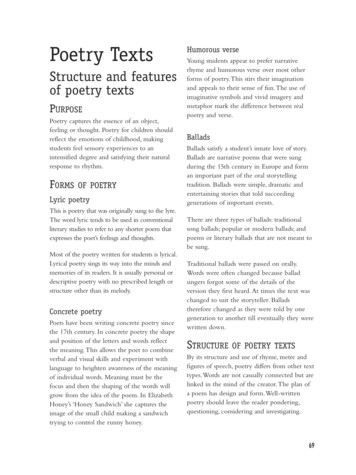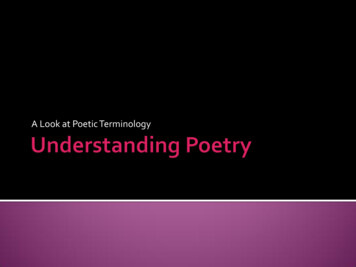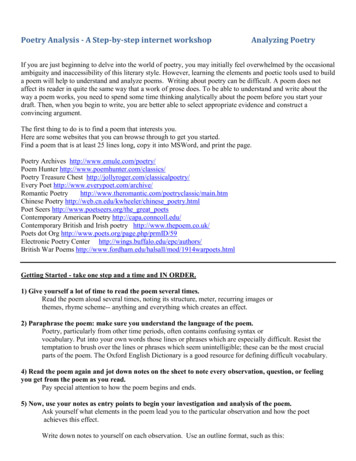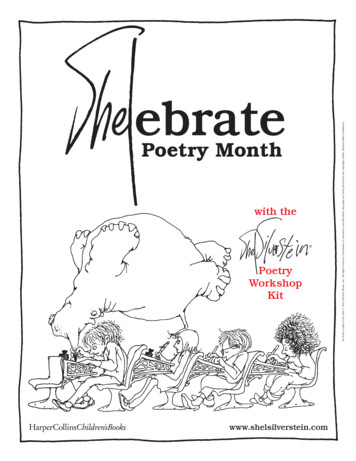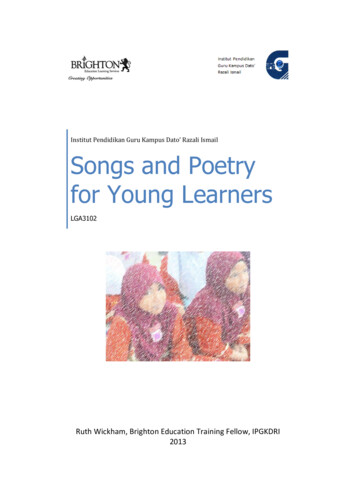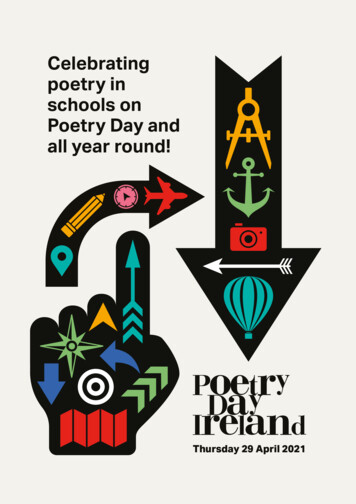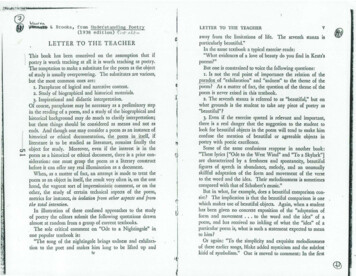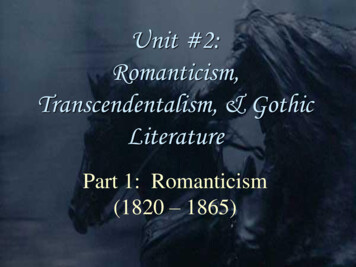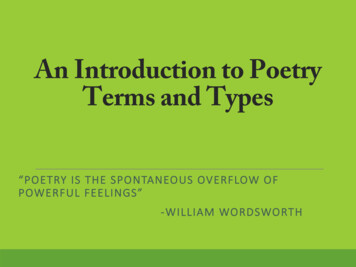
Transcription
STUDENT LESSON AND TEACHER MATERIALS“The Hill We Climb”by Amanda Gorman .
Copyright 2021 by Amplify Education, Inc.55 Washington Street, Suite 800, Brooklyn, NY 11201www.amplify.comCopyright 2021 by Poetry in America/Verse Video Education, Inc.www.poetryinamerica.org
“THE HILL WE CLIMB” TEACHER LESSON BRIEFTeacher Lesson BriefPreparation: This lesson contains a number of links to various internet resources. Please review thelinks to determine which ones which will be useful for your students. Students can read the text of Amanda Gorman’s poem online. If you are able to accessprinted copies of the poem, distribute them to students. Determine whether you would like students to work with the optional part of Activity 2.Teacher NotesActivity 1: Poetic Voice for Page and StagePossible Responses:3. Students might notice vivid imagery, parallel structures, patterns of sound, repetitionand/or contrast, or connection/development of images or ideas from the beginning ofthe poem to the end.4. Support students to notice how Gorman performs the lines—how she uses her voice,her phrasing, her gestures, and her facial expression to emphasize an important imageor idea.Activity 2: Civic VoicePossible Responses:1. Some possible themes students might note: the pain of the past; the hope of thefuture; the democratic work toward a more perfect union; redemption, renewal, andreconciliation; the power of “we”2. Students should note lines that focus on the idea of the destruction—of the nation, ofdemocracy, of people. They should then notice that the lines about possible destructionare followed by images of prevailing and rebuilding. They might also note the use of theinclusive “we.”Student Lesson and Teacher Materials “The Hill We Climb” i
“THE HILL WE CLIMB” TEACHER LESSON BRIEF3. Gorman recites her poem about the climb toward the best values of democracy on thevery steps that climb to the seat of that democracy.4. Students should note that Gorman is a poet taking part in an important moment in thecivic life of the country. They will have a range of responses for the ways in which herpoem urges listeners to participate in American democracy.Activity 3:Possible Responses:1.Students may note the end rhyme example: true/ grew; and the alliteration: wegrieved, we grew/ we hurt, we hoped/ we tired, we tried. When Gorman recitesthese lines, she punches out the alliterative sounds in each phrase (grieved, grew)and even uses her hands to emphasize the connections between these words.2.Answers will vary, but students should connect the physical performance to someaspect of the sound patterns or form of the poem on the page.3–4. Answers will vary. For example, if a speaker emphasized the phrase “if nothing else”in the example from #1, they would highlight the ultimate quality of what is describedon the next three lines.5–6. Answers can vary. Students might notice that Biden’s speech shares many qualitieswith a poem. It was written to be spoken, so the writer separates key phrases intotheir own lines, perhaps to remind him to pause. The speech has many repeating orparallel phrases, which help the listener have a clear sense that they are connected toone another. And the speech contains phrases that are not complete sentences, butwork to paint a picture when spoken. Support students to note that many of thesetechniques are critical to poetry, where the form and sound of the words on the pageplay a big role in communicating the poem to its audience.Student Lesson and Teacher Materials “The Hill We Climb” ii
Background and ContextAs part of the inauguration of President Joe Biden onJanuary 21, 2020, poet Amanda Gorman read the poem shecomposed for the occasion, “The Hill We Climb.”An occasional poem is a poem written for, or to commemorate or reflect on, a particularevent. Often, these poems are written to be read aloud.An inaugural poem is a type of occasional poem written to mark a presidentialinauguration. But not every inauguration features an inaugural poem. ThroughoutAmerica’s history, only four presidents have invited poets to read at their inaugurations.Most recently, Amanda Gorman wrote and performed “The Hill We Climb” for PresidentJoe Biden’s inauguration in 2021.“The Hill We Climb” 1
AN OCCASIONAL POEMIn the following activities, we will consider Amanda Gorman’s “The Hill We Climb” as writtenand as performed.Begin by reading Gorman’s poem. (You can find the full text here; scroll down to read.)Then, watch Gorman’s performance on Inauguration Day.Activity 1: Poetic voice for page and stageWritten poetry: In writing strictly for the page, writers often strive to convey attitude, moodand personality, and even intended audience, through the choice and arrangement ofparticular words on the page. “Voice” in poetry for the page is conveyed through silent print.Performed poetry: Performers of music and poetry on stage also create and cultivatetheir own “voice.” In this context, “voice” refers to something uniquely powerful in theinterpretation or presentation of words out loud.Directions:1. Begin by reading Gorman’s poem silently to yourself. (Your teacher will provide a copyor you can find the full text here; scroll down to read.)2. Which lines or phrases stick out to you most? If you have a printed copy of the poem,underline or highlight the lines or phrases you chose. Copy 2-3 of your chosen linesor phrases.“The Hill We Climb” 2
AN OCCASIONAL POEM3. What is it that strikes you about those particular lines and phrases? Is it the way the wordsor lines look? The way they sound?4. Now, watch Gorman’s performance. Which lines in “The Hill We Climb” stood out toyou when delivered by the poet’s actual voice, out loud? If you have a printed copyof the poem, underline or highlight those lines or phrases.Were these the same lines you identified in your own reading? If yes, what is it about the lines that gave them such resonance on both thepage and stage? If not, why not? What is different when the poem is read aloud?5. Now, try reading “The Hill We Climb” aloud.Did you read any parts differently from how Gorman read them? Why? Take a fewmoments to note any differences between your performance and hers.“The Hill We Climb” 3
AN OCCASIONAL POEMActivity 2: Civic VoiceSituating the text in history: Amanda Gorman wrote “The Hill We Climb” in part as aresponse to the storming of the Capitol on January 6, 2021, when rioters charged the stepsand broke into the halls of Congress. At the inauguration of President Biden two weeks afterthis insurrection, Gorman read her poem aloud while standing on those same steps.Civic Voice: “Voice” is also a term used to describe participation in the wider society. Theword captures the idea that expressing your political opinions is part of being a citizen. Forexample, we often encourage one another to vote, or to participate in the political process inother ways, in order to “make your voice heard.”Directions:1. Reread the poem and annotate repeated ideas or topics. Identify and discuss thepoem’s key themes.2. Can you identify moments in the poem that seem to be written in response to theinsurrection (the storming of the Capitol)? Note 2-3 phrases or lines and explain whatthose lines communicate about how Americans should respond to this crisis.“The Hill We Climb” 4
AN OCCASIONAL POEM3. Take a moment to consider the significance not only of the occasion, but also the location,at which Gorman read her poem aloud. How does the setting for her performance amplifythe significance of her words?4. How is Gorman’s poem an expression of “civic voice”?Optional:Watch Amanda Gorman’s TED Talk about her understanding of the role of poetry in civicand political life. Then discuss: In what ways does Amanda Gorman feel that poetry is the voice of the people? Gorman says that poetry is not about having the right answers, but about askingthe right questions. What questions do you think she is trying to ask her listenersin “The Hill We Climb”?“The Hill We Climb” 5
AN OCCASIONAL POEMActivity 3: Poetry and ProseNow that we’ve explored different meanings of “voice,” let’s look at the relationship betweendifferent forms of writing and voice. How might the way poetry and prose are written suggestthe way they should be read aloud—where pauses should be or where emphasis should fall?Terms:End Rhyme: End rhyme is when the last word or syllables in two or more lines rhyme witheach other.Alliteration: Alliteration is the repetition of initial letter(s) or sound(s) in a group of words.Assonance: Assonance occurs when nearby words (rhyming or non-rhyming) have thesame vowel sound, but the consonants are different . Example: the repetition of the short“a” sound in ladder/matter.Directions:Poetry: To begin, watch Amanda Gorman’s performance while rereading “The Hill We Climb.”1. Consider how Gorman recites the following lines:Let the globe, if nothing else, say this is true:That even as we grieved, we grewThat even as we hurt, we hopedThat even as we tired, we triedWhat sound patterns and rhythms stand out to you as you hear her read?“The Hill We Climb” 6
AN OCCASIONAL POEM2. Can you identify 1-2 additional places where Gorman appears to make a deliberate choicein how she recites based on the techniques of poetry (end rhyme, alliteration, assonance,etc.) that she has employed?3. Can you imagine other ways to recite these same words, phrases, or entire lines? If so,how would you recite them? Explain why you would recite them that way.4. How could your different ways of reciting affect the meaning of the text?“The Hill We Climb” 7
AN OCCASIONAL POEMProse:Now let’s watch President Biden deliver his inaugural speech.5. Look over the printed version of his speech. Can you point to key parts of the text andidentify how certain pauses or points of emphasis he made might have been influencedby how the writing appears on the page?6. Which parts of the speech read like prose, and why? Which parts read like poetry, andwhy? Which features make this speech fit your understanding of prose and/or poetry?Activity 4: Write an Occasional PoemAmanda Gorman’s occasional poem was written to celebrate the Inauguration of apresident. But many other events can also inspire a poet to create an occasional poem.Occasional poems are usually meant to celebrate or address a public event in a waythat will be meaningful to those who have gathered for an occasion. Now it is your turnto create a poem that celebrates or reflects on an event or occasion that you want tocommemorate publicly. Think about an event that stands out in your mind. Maybe it is an event that shaped you,or shaped your family or your society in some way. It might be a personal event that you feel has communal significance and is importantto commemorate with others—an achievement, a fun occasion or milestone with friends,your grandmother’s birthday. It might be a bigger event or issue that feels important - a neighborhood issue or a newsevent that you want to reflect on.Write an occasional poem to commemorate or reflect on your event. Consider the images,words, and sounds that can help communicate the event and its impact to your audience.“The Hill We Climb” 8
TITLE
particular words on the page. "Voice" in poetry for the page is conveyed through silent print. Performed poetry: Performers of music and poetry on stage also create and cultivate their own "voice." In this context, "voice" refers to something uniquely powerful in the interpretation or presentation of words out loud. Directions: 1.
